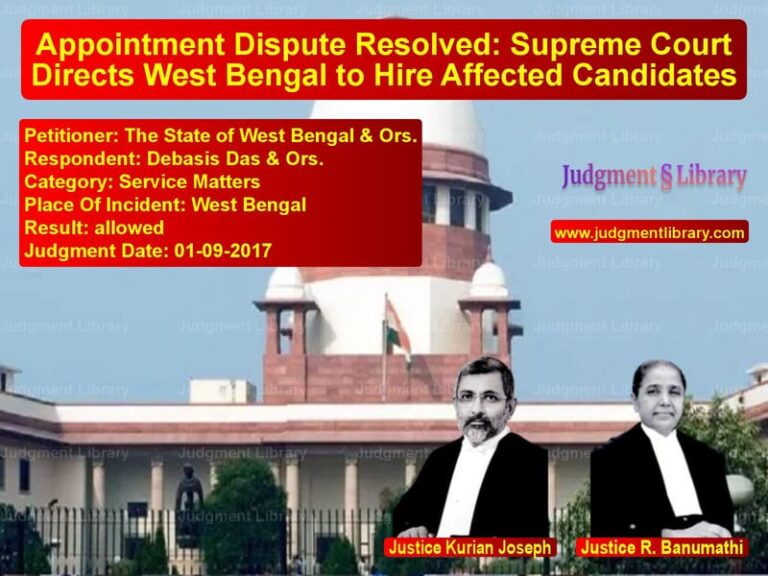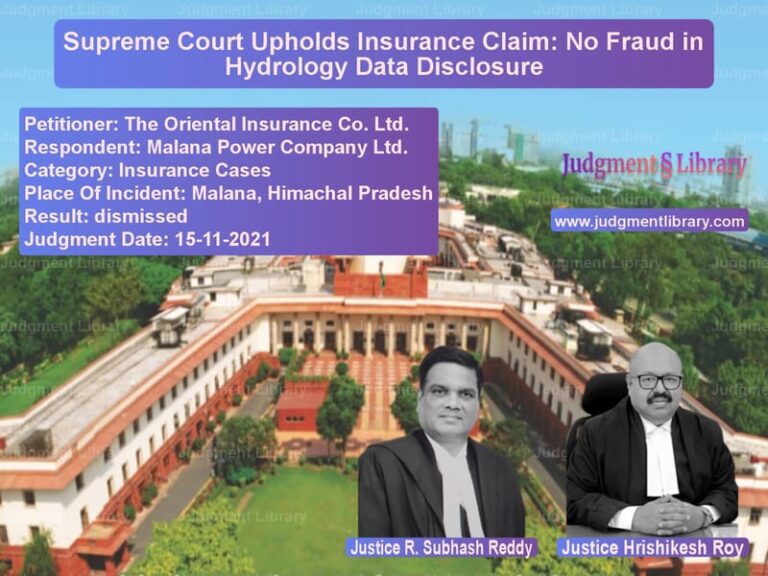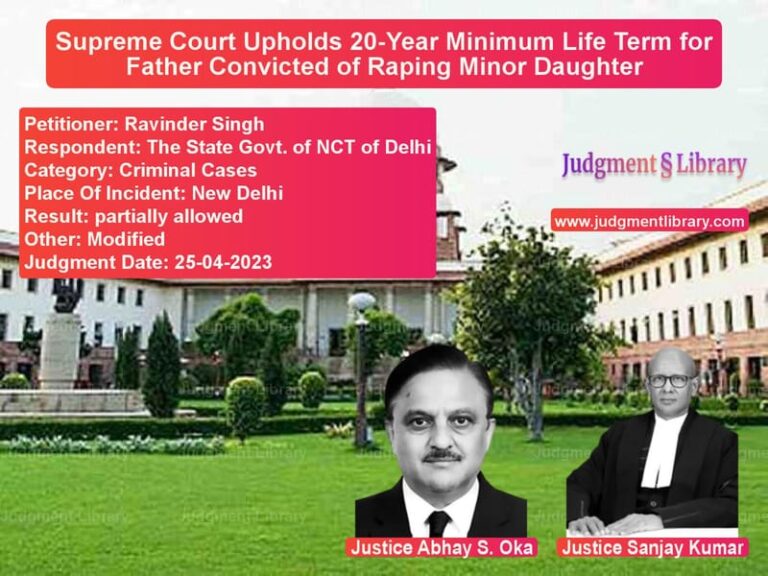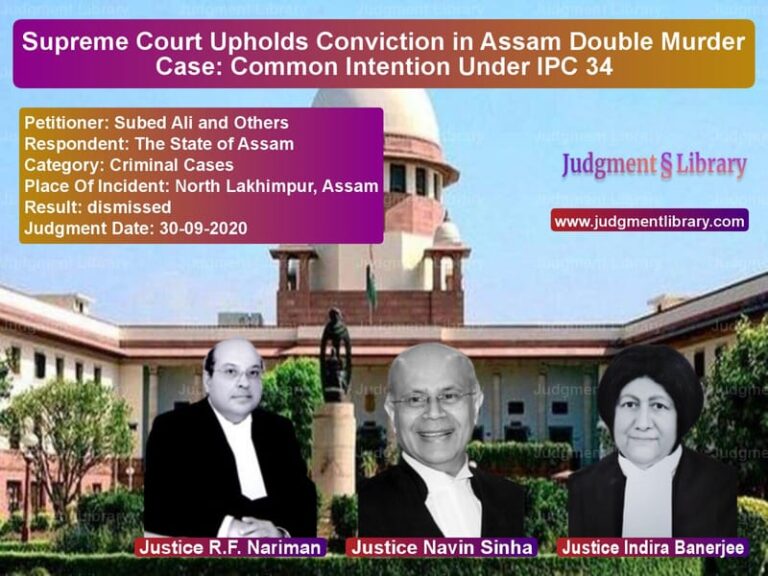Supreme Court Overturns High Court Order in Jharkhand Electricity Substation Land Dispute
The case of State of Jharkhand vs. Surendra Kumar Srivastava & Others involved a legal battle over land ownership and the construction of an electricity substation in Jamshedpur, Jharkhand. The dispute arose when the Jharkhand State Electricity Board (JSEB) began constructing an electricity substation on land claimed by the respondents. The Supreme Court had to decide whether the High Court’s order maintaining status quo was justified.
Background of the Case
The respondents claimed that their mother, Late Smt. Shyal Devi, had purchased 3.61 acres of land in 1958 through two unregistered sale deeds. They alleged that she had constructed a structure on a portion of the land and cultivated the rest. The disputed land was located adjacent to property owned by the Bihar State Road Transport Corporation (BSRTC).
In 1992, Late Smt. Shyal Devi filed a suit against BSRTC, claiming interference with her possession. The trial court ruled in her favor in 1999, affirming her possession. However, on appeal, the Additional District Judge upheld her possession but found she had failed to prove ownership. BSRTC filed a second appeal before the Jharkhand High Court, which remained pending.
Meanwhile, the Jharkhand government approved the construction of an electricity substation on land recorded in the name of BSRTC. The Transport Commissioner issued a No-Objection Certificate (NOC) in 2015 for the land’s transfer to the JSEB.
The respondents, claiming ownership, filed a suit seeking an injunction against JSEB’s construction. Their application for a temporary injunction was rejected by both the trial court and the District Judge, who found they had not proven ownership or possession. The respondents then approached the High Court, which ordered maintenance of status quo.
The State of Jharkhand and JSEB challenged the High Court’s order before the Supreme Court.
Petitioner’s Arguments (State of Jharkhand & JSEB)
- The land was officially recorded in the name of BSRTC, and the Transport Department had legally transferred it for public utility purposes.
- The respondents had no valid ownership documents, as their mother’s claim of ownership had already been rejected in the 1999 appellate decision.
- The High Court erred in granting a status quo order despite lower courts finding no prima facie case for ownership.
- The electricity substation was already constructed and was set to provide power to over 100,000 people.
Respondent’s Arguments (Surendra Kumar Srivastava & Others)
- Their mother had possessed the land since 1958, and they had inherited her rights.
- The lower courts failed to appreciate the earlier court ruling affirming their possession.
- The JSEB could not claim land ownership without due legal process.
- The government’s action was arbitrary and violated their property rights.
Supreme Court’s Judgment
The Supreme Court, led by Justices Ashok Bhushan and Indu Malhotra, ruled in favor of the State of Jharkhand and set aside the High Court’s status quo order. The key findings were:
- Ownership Not Established: The Court noted that the respondents’ mother had failed to establish ownership in earlier litigation, and they had not produced any new evidence to support their claim.
- No Prima Facie Case: The respondents failed to provide any documentary proof, such as municipal or revenue records, to show ownership or possession.
- Public Interest Prevails: The electricity substation was completed and ready to be energized, and delaying it would adversely affect a large population.
- Lower Courts’ Decisions Upheld: The trial and district courts had rightly denied an injunction, and the High Court had improperly intervened.
Observations from the Judgment
The Court cited precedents, including Radhey Shyam vs. Chhabi Nath, reaffirming that writ jurisdiction should not be used to challenge civil court decisions.
“The respondents have failed to establish their title, and a mere claim of long-term possession without proof of ownership cannot override the interests of the public.”
The Court further held:
“Granting an injunction in favor of the respondents would unjustly deprive thousands of citizens of a much-needed public utility.”
Impact of the Judgment
This ruling has significant implications for land disputes involving public utility projects:
- It reinforces that claims of long-term possession without valid title cannot override documented government ownership.
- It affirms that courts should not interfere in infrastructure projects unless there is clear evidence of illegality.
- It prevents litigants from using legal technicalities to delay projects meant for public benefit.
Conclusion
The Supreme Court’s decision in State of Jharkhand vs. Surendra Kumar Srivastava underscores the importance of balancing private claims with public interest. The ruling ensures that critical infrastructure projects are not halted by unsubstantiated ownership claims, setting a precedent for future cases involving public land disputes.
Petitioner Name: State of Jharkhand.Respondent Name: Surendra Kumar Srivastava & Others.Judgment By: Justice Ashok Bhushan, Justice Indu Malhotra.Place Of Incident: Jamshedpur, Jharkhand.Judgment Date: 03-01-2019.
Don’t miss out on the full details! Download the complete judgment in PDF format below and gain valuable insights instantly!
Download Judgment: State of Jharkhand vs Surendra Kumar Sriva Supreme Court of India Judgment Dated 03-01-2019.pdf
Direct Downlaod Judgment: Direct downlaod this Judgment
See all petitions in Property Disputes
See all petitions in Landlord-Tenant Disputes
See all petitions in Public Interest Litigation
See all petitions in Judgment by Ashok Bhushan
See all petitions in Judgment by Indu Malhotra
See all petitions in allowed
See all petitions in Quashed
See all petitions in supreme court of India judgments January 2019
See all petitions in 2019 judgments
See all posts in Civil Cases Category
See all allowed petitions in Civil Cases Category
See all Dismissed petitions in Civil Cases Category
See all partially allowed petitions in Civil Cases Category







